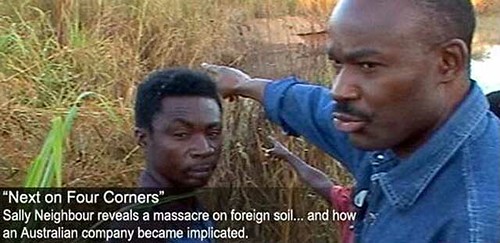 (Adapted from the joint news release.) An association representing Congolese citizens filed a class action against Anvil Mining Limited in a Montreal court on November 8, 2010. The group alleges that by providing logistical assistance the company was involved in human rights abuses, including the massacre by the Congolese military of more than 70 people in the Democratic Republic of Congo in October, 2004.
(Adapted from the joint news release.) An association representing Congolese citizens filed a class action against Anvil Mining Limited in a Montreal court on November 8, 2010. The group alleges that by providing logistical assistance the company was involved in human rights abuses, including the massacre by the Congolese military of more than 70 people in the Democratic Republic of Congo in October, 2004.
The citizens have brought the claim through the Canadian Association against Impunity, an association of survivors and relatives of victims which is supported by a coalition of Canadian, international and Congolese non-government organizations. Representatives of the organisations RAID (Rights and Accountability in Development), ACIDH (Action Contre l’Impunité pour les Droits Humains), Global Witness, and the Canadian Centre for International Justice (CCIJ), act as Board members of this association.
“This case is now in Canada because Anvil is a Canadian company, and must be held accountable for any role it played in what were clear and egregious violations of human rights,” said Matt Eisenbrandt, Legal Coordinator of CCIJ.
“Every day is a struggle to survive and we feel abandoned,” said one of the group members, Dickay Kunda, whose father was badly beaten and tortured while in military custody. Though released after six months, his father died in November 2009. “We have no option but to turn to the international community for justice.”
Anvil Mining admits that in October 2004 it provided trucks, drivers, and other logistical support to the Congolese military to help them counter an attempt by a small group of rebels to take over the town of Kilwa, a key port for Anvil’s operations. In the course of this operation, serious human rights violations were reportedly perpetrated against the civilian population by the military. Anvil’s vehicles transported Congolese soldiers, as well as civilians who were allegedly taken outside the town and executed by the military. The use of Anvil’s chartered planes, vehicles, and drivers enabled the military to quickly reach Kilwa from Lubumbashi, the capital of Katanga province.
“Anvil’s material support enabled the Congolese army to reach the remote town of Kilwa at top speed – where they then carried out widespread abuses against the civilian population,” said Tricia Feeney, Director of UK-based Rights and Accountability in Development (RAID). Anvil Mining has denied any allegations of wrongdoing and has stated that it was compelled to provide this assistance by the authorities.
The Canadian action follows a controversial military trial in the Congo. In 2006, a Congolese military prosecutor indicted nine Congolese soldiers for war crimes, and three expatriate former employees of Anvil for complicity in war crimes. Following numerous irregularities, in June 2007 the military tribunal acquitted all the defendants. The court accepted the company’s defence that it had acted in the framework of a requisition from the Governor of Katanga.
“It was profoundly disappointing that the heavily-politicised trial in Congo failed to deliver justice for the victims. We hope that this case will set a precedent and send a clear message to corporations that they cannot enjoy impunity if they take part in, or benefit from, violent crimes,” said Seema Joshi, Legal Advisor at London-based Global Witness.
“We must continue to fight against impunity. The victims’ families have never lost hope of seeing justice being done,” said Emmanuel Umpula Nkumba, Executive Director of ACIDH, a Congolese group that has been supporting the victims.
A UN report published in August cited the Anvil case as a prime example of how justice is often not done in the Congo. Less than two weeks before this case was launched, the Canadian House of Commons defeated legislation (Bill C-300) that would have created a mechanism for individuals to complain about actions of Canadian companies overseas (see “Bill C-300 A High Water Mark for Mining and Government Accountability in Canada”).
“It has been a long hard road to justice and we are not there yet,” said Georges Kapiamba, Vice-president of Congolese organisation ASADHO, and the main lawyer working with the families of the Kilwa victims and survivors in the Congo. “We sincerely hope the Canadian courts will give the victims the hearing they deserve.”
The claimants are represented by the Montreal law firm Trudel and Johnston, which specializes in class actions.
The claim represents assertions that have not yet been proven in court. Anvil will have the opportunity to respond in these proceedings.
Additional documentation including a timeline, backgrounder, and document titled “Kilwa Trial: A Denial of Justice – A Chronology October 2004-July 2007” are available from RAID or CCIJ. See also the August 2010 report of the UN Office of the High Commissioner for Human Rights, “Report of the Mapping Exercise documenting the most serious violations of human rights and international humanitarian law committed within the territory of the Democratic Republic of the Congo between March 1993 and June 2003”.